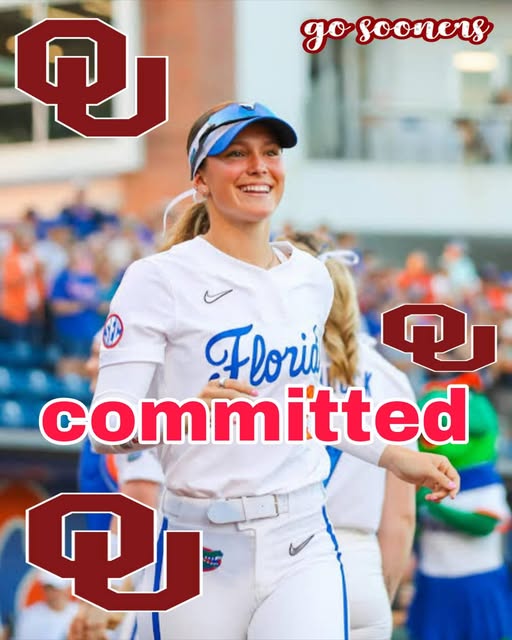In a move that sent shockwaves through the collegiate softball community, Taylor Shumaker, the powerhouse freshman outfielder for the Florida Gators, has reportedly rescinded her commitment to the Gators and pledged to join the powerhouse Oklahoma Sooners. The announcement, which dropped late Sunday night, has instantly become the most talked‑about recruiting development of the spring, setting off a frenzy of reactions from fans, coaches, and pundits nationwide.
Shumaker, who burst onto the scene this past season as one of the most electrifying freshman talents in the country, stunned Florida coaches and teammates alike with her decision after just one collegiate season. Sources close to the player say the decision was not taken lightly—it followed months of soul-searching, heartfelt conversations with her family and mentors, and a careful weighing of her future goals both on and off the field. In the end, it was the call from Head Coach Patty Gasso and Oklahoma’s relentless pursuit that tipped the scales, offering Shumaker a new pathway she nearly couldn’t refuse.
The reaction on social media was instantaneous. Gators fans scrambled to process the news: some in disbelief, many in disappointment, and others lamenting on message boards about what this could mean for Florida’s sustained success. Across the conference line in Norman, enthusiasm erupted. Sooners Nation rushed to third-party fan feeds to celebrate the acquisition of what many consider the single biggest individual recruiting coup in recent postseason history.
To understand the significance of this twist, you need only look at the numbers. In her debut season at Florida, Shumaker led the team in nearly every major offensive category—home runs, RBIs, slugging percentage—and earned the prestigious National Freshman of the Year award. She became a viral sensation, gracing highlights and fan montages with prodigious blasts of power and crisp, confident base-running. For a program that has long prided itself on developing dominant infielders and pitchers, Shumaker was a cornerstone of a new generation: athletic, dynamic, and ready to carry Florida to a national championship.
Florida head coach Tim Walton, a veteran of the NCAA softball world respected for building championship teams, issued a short statement on Monday morning expressing gratitude for Shumaker’s contributions and wishing her continued success. “Taylor is a spectacular young athlete and person,” Walton said. “We’re proud of everything she’s done as a Gator and excited to see her continue to grow. We are disappointed to see her go, but we respect that this is her decision, and we support her moving forward.”
Even before Shumaker announced her departure, murmurs had circulated across recruiting circles. Oklahoma, fresh off its sixth national title in 2024 and already deep into the 2025 postseason, had reportedly kept a keen eye on Shumaker since early spring. Shumaker’s family and support team were invited to Oklahoma’s campus for a personal tour and a direct sit-down with Coach Gasso. Sources say the Sooners presented a detailed roadmap: hitting instruction, off-field development, NIL opportunities, and a prominent leadership role in the Sooners lineup.
For Shumaker, a Long Island native who grew up playing travel ball across the East Coast, the shift from Gainesville to Norman was more than a change of uniform—it represented a total reorientation of her college experience. In her mind, it was about aligning her future with a program that offered both a proven track record and an individualized vision. Whether it’s about developing her into a professional-caliber two-way player or positioning her for future pro and national-team opportunities, the pitch from Oklahoma clearly resonated.
Volume after volume of chatter—tweets, TikToks, podcasts—has debated the emotional impact of Shumaker’s move. Florida freshmen teammates took to social media, posting throwback photos and tagging Shumaker in goodbye messages full of love and character. Gators boosters lamented her exit, with some speculating it could trigger other late flips. Oklahoma supporters, by contrast, flooded fansites with high-definition graphics of Shumaker’s face on a crimson-and-cream background, complete with future jersey mockups and hype clips celebrating what is widely seen as a generational talent landing in Norman.
Beyond the bluster lies a deeper question: could this shift alter the power dynamics of NCAA softball? With Shumaker in the lineup, Oklahoma’s offense would add another threat of elite-grade level—her blend of raw strength and bat-to-ball skills fits the Sooners’ aggressive, run-first style. On overwhelming the opposition with offensive pressure, designed for the post-pandemic power-tempo era, having multiple all‑conference hitters—all capable of homer‑ball—gives the Sooners a serious edge. Imagine the top of the order: Shumaker on deck, working sets of opposite-field line scanners and center-cut detonators. It’s a plug‑and‑play arrangement that, to college‑softball aficionados, looks like a championship injustice for the rest of the nation.
For Florida, rebuilding may begin with retooling its 2026 lineup. With a vacancy in their middle-of-the-order, the Gators recruiting apparatus must scramble to replace the thunder. But the program remains stocked with talent—national top‑10 recruiting classes, stick-and-ball development strategies, and veteran core leadership. The larger loss might be psychological: losing that marquee freshman representational talent—one with the potential to dominate the national awards circuit again as a sophomore—can dent morale.
In the aftermath, the softball world is debating the broader ramifications. How much do NIL dollars and marketing prospects influence recruiting decisions these days? Oklahoma recently announced an expanded NIL deals network with several major brands—shoes, nutrition, women’s sports marketing platforms—and those offerings may have played a substantial role in Shumaker’s move. In interviews, she’s mentioned interest in building her personal brand, but remained tight-lipped about specifics. “There was a lot of conversation about development, exposure, virtual content, community outreach,” said one source close to the player.
Others point to culture and coaching. Coach Gasso’s reputation as a player-oriented mentor with a history of developing power-hitting outfielders into pros is substantial. Gasso has helped bring out breakout seasons from players who, in Shumaker’s words, “had the power but needed polish.” Speaking to local media before the announcement, Gasso said, “We’re always looking for players who love to hit, who love to work, and who embrace opportunity. We have a plan for Taylor.” That hint, combined with perfunctory tours of remade locker rooms and visits to individual instructors, may have sealed the deal.
There’s also an emotional undercurrent to Shumaker’s decision. Florida’s program is winning again; the Gators snuck into the Women’s College World Series last year and showed flashes of national-championship form. But Oklahoma has had the upper hand recently, going deep into the WCWS almost every year—and often walking away with the trophy. For young recruits, the allure of joining a program with current buzz, especially one on a championship streak, is captivating. For Shumaker, chomping at the bit to climb to the top, it may have just felt like the right next step.
Unsurprisingly, NIL has shaken the old recruiting paradigms. Gone are the days of simple scholarship offers and campus visits. Today, recruits want a total package: financial backing through name, image, likeness opportunities; strength and conditioning support; specialized skill development; and long-term branding strategy. Oklahoma’s infrastructure in all these domains is elite. Even Florida, typically near the top in NCAA budget and alumni gifts, has reportedly lagged slightly behind in NIL structuring. That difference, it seems, was enough to tip a borderline recruit like Shumaker. And recruit of her magnitude is rarely borderline.
The implications go beyond college. With professional softball leagues gaining traction in the U.S. and internationally, a player like Shumaker understands that exposure matters. She knows that playing for a storied program like Oklahoma, which regularly draws national TV attention and high-level streaming partnerships, can give her a broader stage—impacting her draft ceiling and pro marketability. In that context, her decision reads as highly strategic and wrist‑snappingly decisive.
Of course, there are critics. Some suggest Shumaker’s move is too early, arguing she should prove longevity with Florida first. Others accuse Oklahoma of aggressive poaching tactics, pulling talent away from less flashy everyday receivers. But Shumaker’s broad base of family and advisors clearly believes her potential outweighs traditions. The decision, after all, happened after a full season: it wasn’t a late de‑commit in high school or a mid‑season switch. It came with leverage: one year of college experience, accolades, and name recognition already under her belt.
Behind the media stories, Shumaker reportedly called key Gators teammates personally to explain her reasoning. Conversations were allegedly emotional but respectful, and many younger players have taken the news in stride, beginning to plot their own paths. Recruiting pipelines will now be tested: Florida must reinforce trust with their next in‑pipeline recruits and reassure them of program stability. But the program also has history: many elite transfers and recruits have walked down the same road before, and Florida has bigger tests coming in the 2026 junior classes.
Inside Oklahoma, the cupboard just got that much richer. Shumaker joins a program built on stacking elite talent, and she fits a mold that Oklahoma has had remarkable success with—power‑hitting outfield royalty. The Sooners, once criticized for relying too heavily on their pitching staff, are increasingly building offenses that rival any in baseball. Shumaker’s commitment is more than a statement—it’s a declaration of intent for the 2026 season and beyond.
In the broader NCAA landscape, other programs are watching closely. Texas, UCLA, LSU, and Arizona—all juggernauts in their own right—are recalibrating recruiting strategies. Coaches across the board are revisiting their NIL partnerships, beefing up brand-building programs, and maybe, just maybe, recalibrating their message: it’s not enough to develop great athletes. They must now also develop great brands.
For Shumaker, the journey is just beginning. She will reportedly complete the transfer paperwork this week, and, barring NCAA timing restrictions or waiver issues, she will be eligible to play for Oklahoma in the 2026 season. The national conversations that will swirl this fall—when the Sooners and Gators meet, or in the 2027 WCWS—will feature her prominently. Every homer, every trophy, every milestone post-2025 will be viewed through the lens of this seismic shift.
From her vantage point, though, this isn’t just about drama or prestige. It’s about being her best, and building something that lasts. Playing with top-tier teammates, under elite coaching, and with brand-building infrastructure has one clear aim: elevate the game and her own place in it. Her stated dream—competing on the Pro Fastpitch circuit, perhaps even with a view toward Olympic softball—now looks more attainable under Oklahoma’s umbrella.
So while Florida counts losses, and the softball world recalibrates, one question looms large: will Taylor Shumaker’s move set a precedent? Will the floodgates open, and will Oklahoma emerge not only as a championship force but as a recruiting dominator? And can Florida, a historic program in its own right, respond without losing more ground?
If one thing is clear, her announcement has irrevocably altered the landscape. Recruits are watching. Fans are lining up. Coaches are strategizing. Oklahoma celebrates a new star, Florida rebuilds quickly, and the softball balance of power shifts—again. Whether this becomes a defining moment for Shumaker or just a footnote in the narrative of collegiate softball remains to be seen. But one thing is undeniable: in June of 2025, Taylor Shumaker shocked the softball world, and in doing so, reshaped its future.



